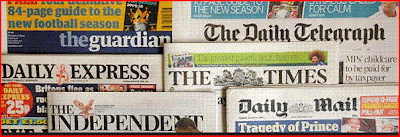Guardian editor-in-chief Alan Rusbridger in the Guardian on the paper's front page on the Woolwich murder (above): "This was an extraordinary, perhaps unprecedented, event. In broad daylight on a British street a man was hacked to death allegedly by someone who then essentially gave a press conference, using Islamist justifications. It was, by any standards, a unique news picture – but in a new media context in which the killer's message had already been distributed around the world virtually in real time."
Guardian readers' editor Chris Elliott in his Open door column on the same front page: "It was right to use the picture and the video, as both were crucial to an understanding of the event. It's not the first time shocking images have been run on the front page. However, the effect of the quote embedded in the photograph meant the message was unmediated."
Daily Mail in a leader: "It is morally unfathomable of our national broadcaster to seize on the gruesome murder of a British soldier as a reason to give a platform to hate preachers blamed for inspiring his killers. Yet such is the BBC’s grotesque thinking when it invites the likes of Anjem Choudary, who refuses to condemn Lee Rigby’s slaughter, to outline their case for destroying our country’s way of life."
Sarah Branthwaite of Foot Ansty on Woolwich and the contempt law in the digital age, on HoldtheFrontPage: "In order to assemble a truly neutral jury for any future trial of these suspects, one imagines enquires being made to locate individuals who were in a coma last week but fully recovered in time for the trial."
Carl Bernstein interviewed in the Daily Telegraph claims Britain is: "On the verge of inhibiting press freedom and that is corrosive, even potentially fatally corrosive, to a democracy, and to your great democracy, because a free press is the only institution that, when push comes to shove, is liable to keep up freedom."
Matthew Parris in The Times [£] salutes newspaper proprietors after they were criticised in a speech by ex-Labour MP Chris Mullin at The Orwell Prize: "Does he not understand how many proprietors down the ages have loved newspapers, cared about their survival, believed in their journalism and knowingly acted as patrons to talented journalists and tremendously important investigation, reporting and scrutiny, whose commercial usefulness is often a complete unknown? Does he realise how precarious now is the whole future of daily newspapers in Britain? Apart from historic buildings and football clubs I know no other sector where owners and investors appear so willing to pay for the privilege of losing money in the public interest."
Michelle Stanistreet in the Guardianon Local World boss David Montgomery: "Amid the management-speak, Montgomery's vision is a chilling one. Does he really have so little inkling that it is high-quality journalism and top-quality writing that is the key to successful newspapers and websites? His thinking is sadly not unique; it is a pattern we are already seeing. Journalists are being reduced to pouring words – sorry content – into pre-determined grids, with the danger of turning newspapers into open sewers."
Former Irish Times editor Conor Brady, quoted by Roy Greenslade, on problems facing the press in Ireland: "There are fewer journalists and they're working longer hours, discharging more tasks and spreading themselves across a wider range of duties than ever before. Not only this. Many of them are being poorly paid; there are very few new entrants now with the security of staff jobs."
Ex-Birmingham Mail editor Steve Dyson on HoldtheFrontPage on why he no longer buys his old paper: "The reason I’ve stopped buying the paper is because an exact replica is now available free of charge – yes, completely buckshee – on my iPad. I’m owning up to my print desertion because this iPad moment deserves comment, debate and careful consideration by the industry."
The NUJ in a submission to the Culture Secretary opposes the industry's proposed Royal Charter on press regulation: “The alternate charter removes the obligation to offer an arbitration system, run under the auspices of the regulator set out in the Crime and Courts Act 2013. The NUJ believes this attempt to drop the arbitration system is a sign of contempt for both the public and parliament from UK publishers. They are not prepared to accept their past bad behaviour; they have little intention of behaving better in the future and they will continue to put profit before ethics.”
Roy Greenslade on his MediaGurdian blog on steep cover price rises on some of Newsquest's regional newspapers: "You have to hand it to Newsquest/Gannett. They certainly know how to milk a cow to death."
Michael Wolff
[£]=paywall













